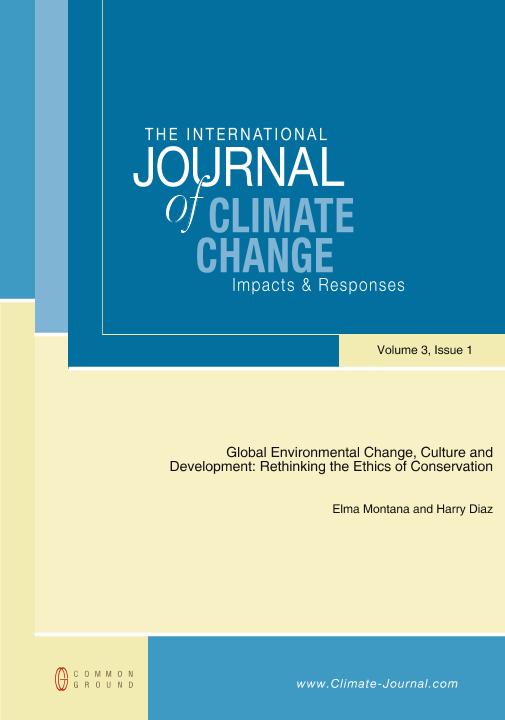Mostrar el registro sencillo del ítem
dc.contributor.author
Montaña, Elma Carmen

dc.contributor.author
Diaz, Harry Polo

dc.date.available
2019-06-21T18:59:02Z
dc.date.issued
2011-12
dc.identifier.citation
Montaña, Elma Carmen; Diaz, Harry Polo; Global Environmental Change, Culture and Development: Rethinking the Ethics of Conservation; Common Ground Publishing; The International Journal of Climate Change: Impacts and Responses; 3; 1; 12-2011; 31-40
dc.identifier.issn
1835-7156
dc.identifier.uri
http://hdl.handle.net/11336/78661
dc.description.abstract
Expected changes in climate and hydrology in Latin American drylands are likely to affect drinking and irrigation water availability, threatening productive systems and the subsistence of some rural dwellers. Research on the vulnerability of rural communities in watershed basins of Argentina, Bolivia and Chile have shown that drought and diminishing river flows would compromise the wellbeing of the smallest producers of these socio-ecological systems, who are already affected by other stressors, such as globalization, restricted fiscal policies and long established situations of poverty and inequity. Thus, it seems that global environmental change threatens the survival of specific agricultural development models, not those that are more integrated to the agribusiness processes but rather the subordinated, traditional models based on small-scale production and tightly connected to natural cycles. Along with their decline, traditional testimonies and practices related to these models would be lost, including their interpretative schemes and rationales based on values and worldviews different from the prevailing development model. The paper argues that these social and cultural capital losses would entail a drawback in the achievement of development goals?especially for those locally inspired,and that subordinate development models constitute, in themselves, a heritage worth to be preserved. In addition to linking global environmental change to culture loss and to the development processes, the paper suggests the necessity of rethinking the ethics of conservation to promote a new multiculturality paradigm that values small scale productive and lifestyles and understands its connections with nature.
dc.format
application/pdf
dc.language.iso
eng
dc.publisher
Common Ground Publishing
dc.rights
info:eu-repo/semantics/openAccess
dc.rights.uri
https://creativecommons.org/licenses/by-nc-sa/2.5/ar/
dc.subject
Vulnerability
dc.subject
Drylands
dc.subject
Development Models
dc.subject
Conservation
dc.subject.classification
Otras Ciencias Sociales

dc.subject.classification
Otras Ciencias Sociales

dc.subject.classification
CIENCIAS SOCIALES

dc.title
Global Environmental Change, Culture and Development: Rethinking the Ethics of Conservation
dc.type
info:eu-repo/semantics/article
dc.type
info:ar-repo/semantics/artículo
dc.type
info:eu-repo/semantics/publishedVersion
dc.date.updated
2019-02-12T14:12:31Z
dc.journal.volume
3
dc.journal.number
1
dc.journal.pagination
31-40
dc.journal.pais
Estados Unidos

dc.journal.ciudad
Illinois
dc.description.fil
Fil: Montaña, Elma Carmen. Consejo Nacional de Investigaciones Científicas y Técnicas. Centro Científico Tecnológico Conicet - Mendoza. Instituto de Ciencias Humanas, Sociales y Ambientales; Argentina
dc.description.fil
Fil: Diaz, Harry Polo. University of Regina; Canadá
dc.journal.title
The International Journal of Climate Change: Impacts and Responses
dc.relation.alternativeid
info:eu-repo/semantics/altIdentifier/url/http://https://cgscholar.com/bookstore/works/global-environmental-change-culture-and-development?category_id=common-ground-publishing/product/pub.185/prod.127
dc.relation.alternativeid
info:eu-repo/semantics/altIdentifier/doi/https://doi.org/10.18848/1835-7156/CGP/v03i01/37094
Archivos asociados
